Killer Coke Update | January 24, 2008
Coke's Scams & Abuses Face Mounting Opposition
Contents of This Newsletter
- TERI Report on Coke in India: An Attempted Whitewash Gone Awry
- College/University Updates
- Binghamton University, SUNY, New York
- College of Wooster, Ohio
- Earlham College, Indiana
- Indiana University Bloomington
- Joseph Murphy Institute, CUNY, New York
- Loyola University Chicago
- McMaster University, Canada
- Ohio State University
- Pitzer College, California
- Simon's Rock College, Massachusetts
- Stony Brook University, SUNY, New York
- University of Albany, SUNY, New York
- University of Georgia
- University of Michigan
- University of Montana
- University of Oklahoma
- University of San Francisco, California
- University of Saskatchewan & University of Regina, Canada
- University of Vermont
- Vassar College, New York
- USAS Announcement
- Labor Updates
- Poland's Growing Stop Killer Coke Campaign Worries Coke
- Videos Exposing Coke's Lies & Worldwide Abuses
- Coke Director Cathleen Black Event
- Doonesbury, Dasani Remains DaPhony and Other Water Issues
- Health Issues
- Major Reports from the Campaign that are Useful in Organizing
- Do You Need a Customized Campaign Leaflet?
- Campaign's 'Campus Activism' Section
- Take Actions Against Coke
- Please send Photos, Reports of Events, etc. for the Campaign Website
1. TERI Report on Coke in India: An Attempted Whitewash Gone Awry
To a corporate giant like The Coca-Cola Company, $2 million is insignificant pocket change - literally a drop in the ocean of money it extracts from the worldwide markets where its overpriced, often unhealthy beverages are sold.
So, did Coca-Cola get its money's worth when it paid a New Dehli-based think tank $2 million for a "third-party assessment" of the environmental havoc it has wreaked in India?
"From a PR standpoint, which has always been Coke's primary concern, it appears they did," said Ray Rogers, director of the Campaign to Stop Killer Coke. "At the same time, it confirms Coke's gross misconduct with water management problems and how they caused environmental damage they've been denying for years."
The report by The Energy and Resources Institute (TERI), 16 months in the making, noted that while the plants it evaluated — only six of more than 50 Coke operates in India - may have met some government regulatory standards, most did not achieve the wastewater standards set by the company itself because of "presence of faecal coliform and several other physico-chemical pollutants in the treated wastewater."
TERI ignored, for reasons never explained, the Coke bottling plant in Plachimada, Kerala, that has been shut down since March 2004 after massive protests by activists from surrounding farms and communities devastated by water scarcity and pollution.
However, the report said a watershed at Kaladera, Rajasthan, where one plant is located, has been so "overexploited" that Coke should consider relocating the plant or shutting it down.
Misleading headlines (like "Coke Makes Cleanup Gains" in The Wall Street Journal) helped Coke apply its PR spin to the TERI story, but no amount of glib interpretation can hide the fact that Coke continues to cause devastating local water shortages.
The report notes, for example, that Coke's choices on where to site their plants are "strictly business" decisions that cause great distress to local communities. It bluntly states that "community water issues do not appear to form an integral part of the water resource management practices of The Coca-Cola Company."
It even points out that the company hampered TERI's assessment by refusing to share the environmental impact assessments for any one of the six plants.
Perhaps most noteworthy of all, it validates the main concerns of protestors about water scarcity and pollution. "In general, the community perceptions were found in conformity to the results obtained from the detailed technical assessment of groundwater resources," the report said.
Coke may claim to have been vindicated on the issue of pesticides since TERI said it detected none in the water at the six plants, despite Indian environmentalists' findings that showed dangerous levels in Coke drinks. But Coke is still doing its best to downplay or conceal the fact that TERI tested only water, not Coke products
According to the Center for Science and Environment (CSE), headed by Sunita Narain, who won the 2005 Stockholm Water Prize, Coca-Cola could not be described as pesticide-free, because only the water had been tested and not the rest of the ingredients. A CSE statement said: "TERI has not tested the final product, which we drink. The CSE studies in 2003 and 2006 tested bottles of colas and found pesticides above safe limits in the drinks."
"Coke's ability to influence the timing and media analysis of the TERI report made it well worth the company's piddling $2 million investment," said Rogers. "They wouldn't pay two bucks for a report they couldn't see first and sanitize as much as they could."
The University of Michigan and Coca-Cola agreed to commission the TERI report after students argued that Coke's water-management practices violated the university's code of conduct for vendors. UM was among the largest of more than 46 colleges and universities that removed Coke products from campuses because of flagrant corporate irresponsibility overseas, particularly in India and Colombia.
Lawsuits filed in 2001 and 2006 by the International Labor Rights Fund and the United Steelworkers Union, AFL-CIO, charging Coke bottlers' complicity with Colombian terrorist-paramilitaries who have kidnapped, tortured, illegally detained and murdered members of the SINALTRAINAL union, are proceeding - and so are the students, labor and environmentalist protests that TERI's report utterly fails to quell.
Note: We at the Campaign to Stop Killer Coke are committed to continue working with students, faculty and others in the University of Michigan community to get all Coke products removed from the campus and to hold those adminstrators who have served as Coke cheerleaders accountable.
India Resource Center, "New Report Highlights Coca-Cola's Shortcomings in India," January 21, 2008
Read Press Release
'The report by TERI is a damning indictment of Coca-Cola's operations in India. The report takes the company to task for siting its bottling plants in already water stressed areas, without much thought given to the impacts on communities. The report also validates the concerns of water scarcity and pollution that have been raised by communities in Kala Dera, Mehdiganj as well as others. A list of Coca-Cola's shortcomings, according to the report, follows this press note."
The Hindu, "Coca-Cola claims questioned,"January 17, 2008
Read Article
"He [R. Ajayan ofThe Plachimada Samara Aikyadartya Samithi] said Coca-Cola's decision to get a 'third party study' done by an institution that 'enjoyed its sponsorship' had created a lot of protest in the country. Even so, the report of the Delhi-based TERI, released on Tuesday, did not give the company a clean certificate as was being made out by 'propagandists.'"
The New York Times, Coca-Cola Urged to Close an Indian Plant to Save Water," By Amelia Gentleman, January 16, 2008
Read Article
"A leading environmental research group based here has asked Coca-Cola to consider shutting down a bottling plant in the drought-stricken state of Rajasthan, saying that the plant is depleting scarce water supplies."
IndiaPost.com, "TERI calls for closure of Coca-Cola plant," January 16, 2008
Read Article
"In a major blow to the Coca-Cola company in India, a report by its ally, the Energy and Resources Institute (TERI), has called for the closure of one of its bottling plants in India - in the village of Kala Dera in the state of Rajasthan. Citing the widespread water shortages being experienced by villages around Coca-Cola's bottling plant, the report by TERI recommends that either the Coca-Cola bottling find alternative sources of water - a highly impractical option - or either relocate or shut down the plant altogether."
The Economic Times, "TERI report not a clean chit to Coke: Plachimada Council," January 15, 2008
Read Article
"In a statement here, council convenor R Ajayan said TERI's 500-page report had not made any suggestion of a clean chit, though the report was an attempt to hide certain facts and `whitewash' the company's operations.
"The Plachimada Coke plant, which could not operate for the last four years following locals' agitation was left out from the purview of the study. The report was silent on why the plant at Plachimada and the one at Ballia in Uttar Pradesh had to suspend their operations.
"The Coca-Cola company's attempt to regain its lost credibility had once again failed, Ajayan said. The company should explain to the people why Plachimada was not included in the study conducted by TERI, he added."
International Environmental Law Research Centre, "Legal Implications of Plachimada: A Case Study," By Sujith Koonan, May 2007
Read Report
"The deterioration of groundwater in quality and quantity and the consequential public health problems and the destruction of the agricultural economy are the main problems identified in Plachimada. The activity of the Coca Cola company has caused or contributed a great deal to these problems. The people living in the vicinity of the Company have been suffering these problems for the last few years. The availability of good quality water for drinking purposes and agriculture has been affected dangerously due to the activity of the Company. Apart from that, the Company had also polluted the agricultural lands by depositing the hazardous wastes. All these points to the gross violation of the basic human rights, that is, the right to life, right to livelihood and the violation of the pollution control laws."
Austin American-Statesman, "Coca-Cola, Indian village in dispute: Some locals say company used up, polluted water," By Craig Simons, December 25, 2007
Read Article
"PLACHIMADA, India - The gate of the Coca-Cola bottling plant in this remote village is locked. Weeds grow around warehouses that have been idle since 2004, when the local government ordered Coke to halt operations...Some villagers in Plachimada say that after Coke began drawing water from a local aquifer to make soft drinks in 2000, wells dried out and groundwater began to smell and sicken people who drank it. State environmental officials accuse Coke of giving factory waste laced with cadmium, a highly toxic element, to locals as fertilizer."
The Telegraph, "Popular Bijoli drink to make a comeback," By Amit Chakraborty
a. Binghamton University, SUNY, New York
Nov. 8 Day of Action
Binghamton University Holds a Funeral
Today was awesome. The procession went well and hit right at class changes. There were about 25 people holding coffins, tombstones, signs. To top it off we had a drummer and one person dressed like death (Halloween costume). We marched to the administration building and did a talk, then marched to a prominent area and left the coffins there for a majority of the day, got signatures, and handed out info.
Three Local stations came and did interviews and put the reports on the news. We are going to have a meeting with a vending body set up ad-hoc to deal with the issue.
See Fox 40 News at 10
Pipe Dream (Binghamton University, SUNY), "Students hold Coke 'funeral' By John Jensen, November13, 2007
Read Article
"A funeral procession covered the grounds of Binghamton University last Thursday, as a student group on campus took action against one of the school's major corporate partners.
"Killer Coke, a student group on campus, held a faux funeral on Thursday in an act of protest against the Coca-Cola Company for their alleged involvement in the murders of eight union leaders in Colombia."
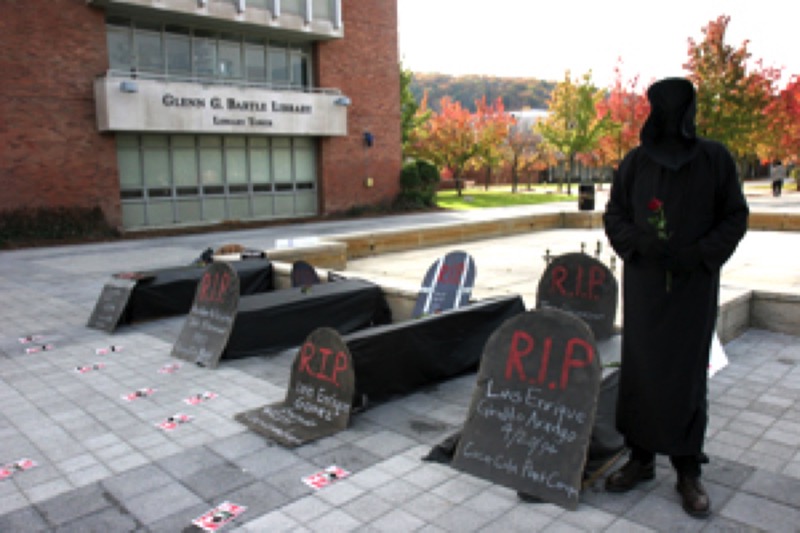
Pipe Dream (Binghamton University, SUNY), "Campus gets a wake-up call," By the Editorial Board, November 13, 2007
Read Article
"Killer Coke's props were more than just posters. Their elaborate procession drew attention to their cause, and the group has continued to gain momentum for their anti-Coke mission. Given that the University's most appealing pieces of real estate (from vending machines to the New University Union) have been sold to faceless corporations, standing up to the Coke giant is an impressive goal."
Last semester the Wooster Democratic Socialists (WDS) held a forum to discuss Coke's human rights issues. The panel was composed of both teachers and students. Prof. Holt spoke on the history of Coke in Colombia and the labor environment for Colombia. Prof. Schultz spoke on the environmental and health implications of Coke's actions in India. Prof. Moledina spoke about the effects of muti-national corporations and the developing world. Lauren Hines spoke about her experiences with Coke and the indiginous people of Chiapas, Mexico. Two members of WDS were also part of the panel to talk about what the campaign had done and future plans. The forum was well attended and raised some very interesting points.
Nov. 8 Day of Action
Earlham College Has an Alternative Drinks Party
Hey All You Amazing Anti-Coke Organizers!!!
We're havin' an awesome Alternative Drinks Party with our mascot here at Earlham! We got a pretty good turnout and people are having a good time, drinking lots of free organic soda!
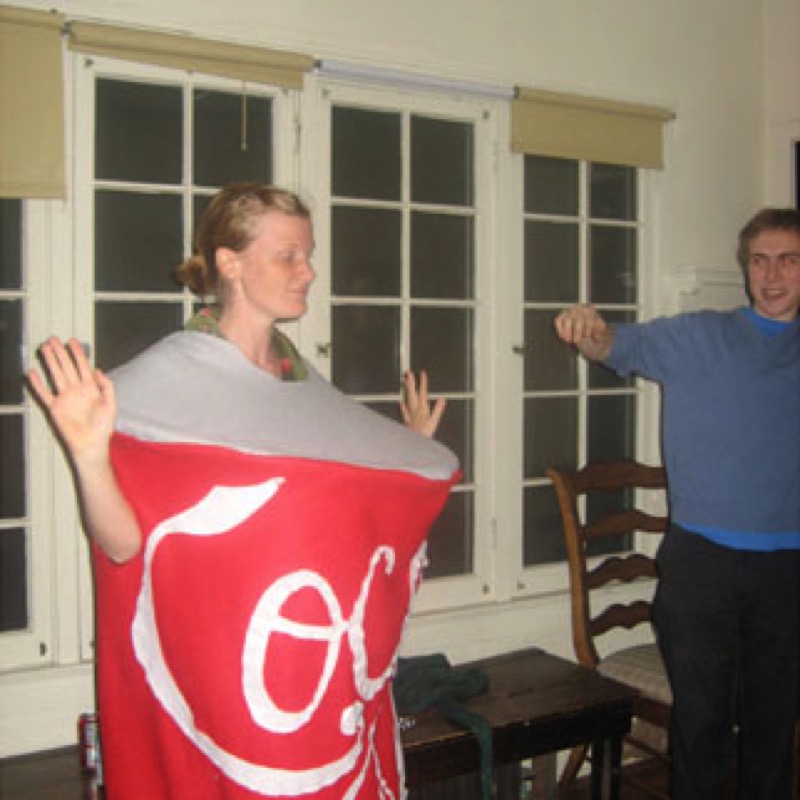
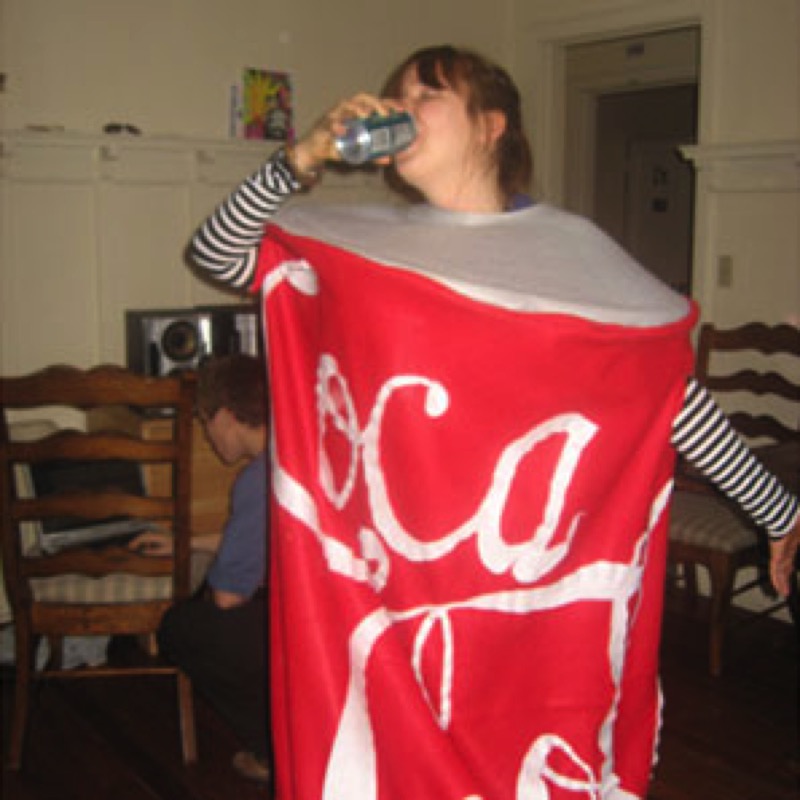
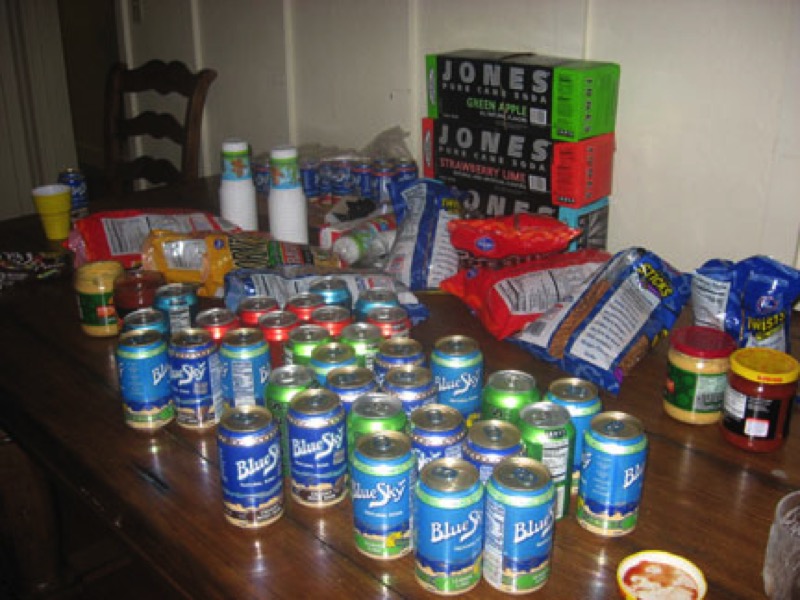
d. Indiana University Bloomington
Email received from IU:
"Just wanted to share that No Sweat! @ IU Bloomington will be having its mascot action Dec. 4. Our 'killer-cola' can outfit is a cylinder of chicken wire (a lightweight mesh like a chain-link fence) covered with painted red cloth. The mascot will wear a ski mask to connect them to paramilitaries, and will lead a procession of 'zombie' Coke victims through our student union. We aim to make this a very informative action.
"Also, we'll likely be meeting the university president soon to make our Coke case directly, and our Dean of Students has told us the anti-sweatshop advisory committee will have its first meeting immediately following the winter break (two USAS @ IU group members will be on the committee, and the Coke issue will be on the table).We hope to hear how things are going with you all, when you're planning to have your mascot action, and if you have any suggestions for IU!"
Indiana University Day of Action Phone Bomb
Indiana University's Stop Killer Coke campaigners developed an idea for the Day of Action — a phone bomb. Supporters were asked to call the IU president while their actions were taking place with the following message:
(first ask to speak with President McRobbie)
"Hello, my name is ___(your name)______ from ____(your school or home)______ and I am calling to address the blatant and well-documented human rights abuses of Coca-Cola, a corporation that has an on-going contractual relationship with Indiana University. As an institution with a stated commitment to basic human and international labor rights, I implore IU to take action against this contract. The university has already taken a stand for human rights in its Code of Conduct for IU licensed apparel. Licensees found in violation of IU's basic human rights standards have their contracts re-examined, and, if necessary, cut. Coca-Cola should be treated accordingly. As a labor rights leader, IU has a duty to uphold human rights which must be reflected in its business relationships. To continue business with Coca-Cola when it does not meet its ethical and legal obligations is to condone its crimes. Thanks for your time. Have a nice day!"
e. Joseph Murphy Institute, City University of New York
Joseph Murphy Institute, CUNY, New York, removes Coke vending machine
The Coke vending machine at the Josephy Murphy Institute, part of the CUNY system, has been removed thanks to Union Semester students! Thanks to the Murphy Institute for doing the right and just thing.
Here's the statement, approved by Gregory Mantzios, Director of the Murphy Institute:
As an Institute of the City University dedicated to the education of union members and New York City workers, we want you to know that we are removing all Coca Cola products from vending machines in our facility. We cannot support a company in blatant violation of the basic right of all workers to organize for just, humane, and decent working conditions. In solidarity with workers in Colombia, we refuse to buy any of your products, and ask that you stop your violent reprisals against those seeking their rights as workers and as human beings.
As an individual, I must add my voice to those who object to your treatment of Colombian workers because my father worked for Coca Cola Bottling Company in Asbury Park, New Jersey for more than 40 years, and served as a Teamster shop steward for some of that time. I owe it to his memory to speak out against actions he would deplore by a a company to which he gave so much of his life.
Deborah D'Amico, Senior Program Developer, PhD
Josephy Murphy Institute
Nov. 8 Day of Action
Joseph Murphy Institute, City University of New York, Demonstrates at the International Labor Organization
Joseph Murphy Institute, CUNY, New York, organized a die-in in front of the New York Headquarters of the International Labor Organization. Why was the ILO chosen as a target?
In April 2006, The Coca-Cola Company falsely claimed that the United Nations' International Labor Organisation (ILO) had agreed to do an "independent investigation of past and present labor relations and workers' rights practices of the Coca-Cola bottling operations in Colombia."
The University of Michigan's newspaper, The Michigan Daily reported on April 10, 2007 that The Coca-Cola Company missed all deadlines set by the University of Michigan for March 2007. Those deadlines pertained to assessment of conditions for Coke workers in Colombia... On April 30, 2007, investigation results were to be reported to the university. This could not be done, since no investigation had occurred.
The Sydney Morning Herald reported on June 6, 2007: "Employers led by Coca-Cola executive [Ed Potter] stopped the International Labour Organisation examining violations of workplace rights in Colombia?" Potter certainly appears to be working to shield Colombia and Coca-Cola from any real scrutiny at a time when the Colombian government and multinational corporations are getting unwanted attention for their ties to paramilitary death squads that prey on workers and their unions. It is a shame that the ILO is allowing itself to be used by The Coca-Cola Co.
Click here to see a video of the Die-In.
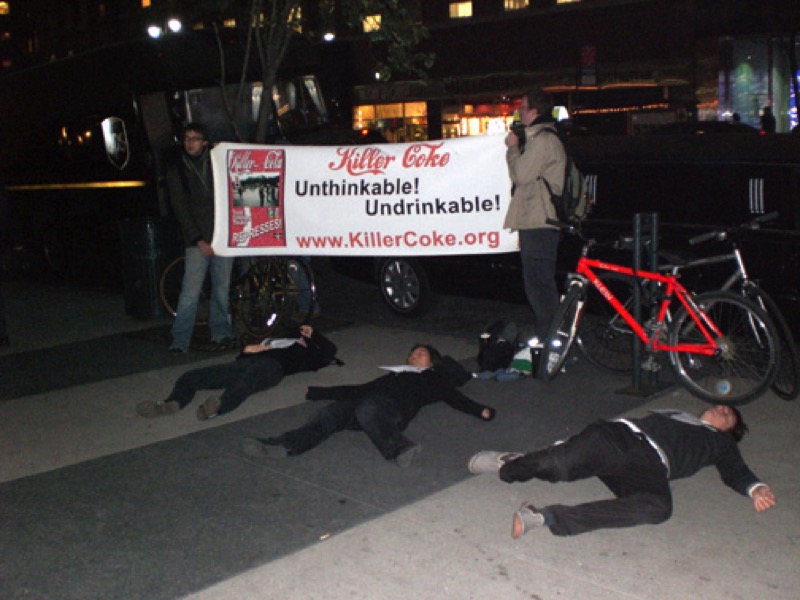
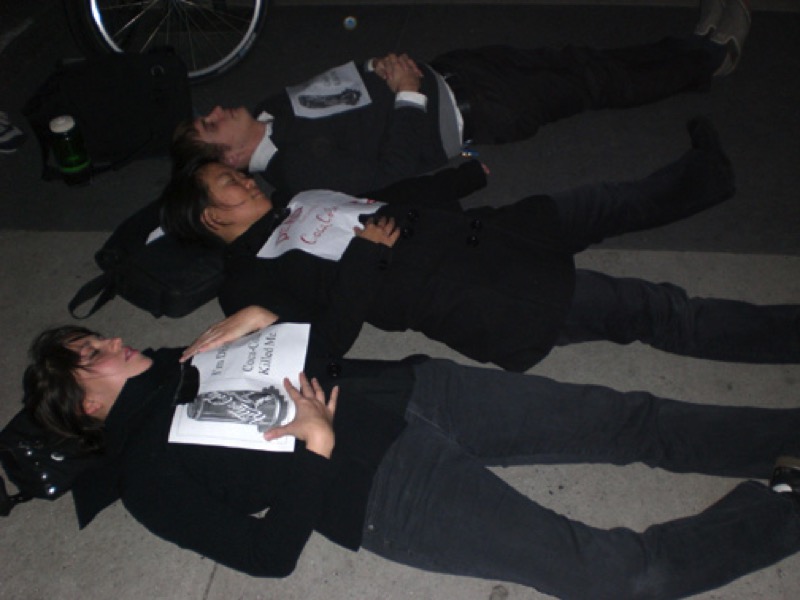
We recently learned that Loyola administrators decided not to resign an exclusive contract when Coca-Cola's current contract expires in July. Instead, adminstrators decided to sign five year contracts with Coca-Cola and Cadbury Schweppes. However, if the university is serious about its commitment to its mission of social justice and righting wrongs, it will remove Coke completely from its campus.
Its decision was based on false information. Ray Rogers, the director of the Campaign to Stop Killer Coke has made repeated phone calls to President Garanzini and his chief of staff, Wayne Magdziarz, regarding erroneous information they received in their purported investigation pertaining to Colombia. If administrators at Loyola are serious about taking appropriate action and meeting their moral responsibilities to the Loyola community, they will return Ray's phone calls and then act accordingly. We will be reporting more on this issue in future newsletters. The letter that Ray sent to the president, his cabinet and the beverage committee can be read here.
Students who take the mission of the university seriously have done a terrific job in ending Coke's exclusive contract. We hope university administrators will match the high standards set by these students who are living up to the university's mission.
The Phoenix (Loyola Chicago), "Coca-Cola debate nears settlement Committee looks to Colombian Jesuits for input," By Anthe Mitrakos, December 5, 2007
Read Article
g. McMaster University, Canada
Day of Action
McMaster held a ceremony for the dead Colombian trade union leaders.
"We had a ceremony in front of our student centre paying respect to the dead trade union leaders. There was a good turnout of both undergrads and faculty. We turned a couple of heads obviously as we had very good speakers."
Campaign to Stop Killer Coke Director Ray Rogers addressed a gathering of some 100 students, faculty and administrators at OSU on January 16. The event was organized by Students Against Coke (SAC), an officially recognized group at OSU. Eddie Klatka of SAC introduced Ray by reading a message sent to OSU from Coca-Cola trying to explain why the Company would not send a representative to the forum.
"We refuse to recognize killer coke as a legitimate voice on this issue. We are more than happy to address students, faculty and staff and answer any and all questions they may have on these important topics. What we will not do is allow our executives to be publicly insulted, humiliated, or otherwise disrespected by politically motivated career activists."
Eddie added, "Let me tell you a little about the person they refused to debate:
"Ray Rogers is the director of the worldwide Campaign to Stop Killer Coke. Over the past 30 years he has been described in the media as 'one of labor's most successful union organizers since the CIO sitdown strikes of the 1930's'.
"Time magazine commented that 'Rogers has brought some of the most powerful corporations to their knees, and his ideas are spreading.'
"In a feature article on the KillerCoke Campaign, Business Week described Ray as a 'legendary union activist' and the Financial Times of London dubbed him 'Coca-Cola's fiercest foe.'
His organization Corporate Campaign, headquartered in New York City launched the worldwide Campaign to Stop KillerCoke. According to The Nation magazine, the Coke campaign has grown into the "largest anti-corporate movement since the campaign against Nike for sweatshop abuses."
After the introduction, Ray described the disrepect shown him at Coca-Cola's annual shareholders' meeting in 2004 by quoting statements from the Washington Post and other news sources on how he was assaulted from behind by Coke's security guards when he dared to challenge Coke's CEO over the company's lies, crimes and immoral conduct.
As part of the presentation, the first 25 minutes of the documentary, "Mark Thomas on Coca-Cola," aired nationally in England on November 19, was shown. The first 25 minutes highlighted Coke's involvement with Nazi Germany, violence against anti-Coke protestors in India, complicity in the murder of labor leaders in Colombia and benefiting from hazardous child labor in the sugar cane fields of El Salvador where Coke's plants are also shown creating widespread environmental pollution.
For more than 90 minutes, Ray responded to one question after another. At the end of the meeting, Ray asked for a show of hands of those who thought Coke should be kicked off the OSU campus. All hands went up.
The Lantern, "Coca-Cola under serious scrutiny," By Briony Clare, January 18, 2008
Read Article
"Students Against Coke sponsored a forum, "Coke and You," Wednesday night that accused Coca-Cola of human rights violations in Colombia, the exploitation and pollution of water sources in India and other environmental and ethical infractions. Coca-Cola declined an invitation to the event, saying they refused to put themselves "in a public forum with professionals ... with false information and graphic videos." A company representative denied all accusations made by SAC.
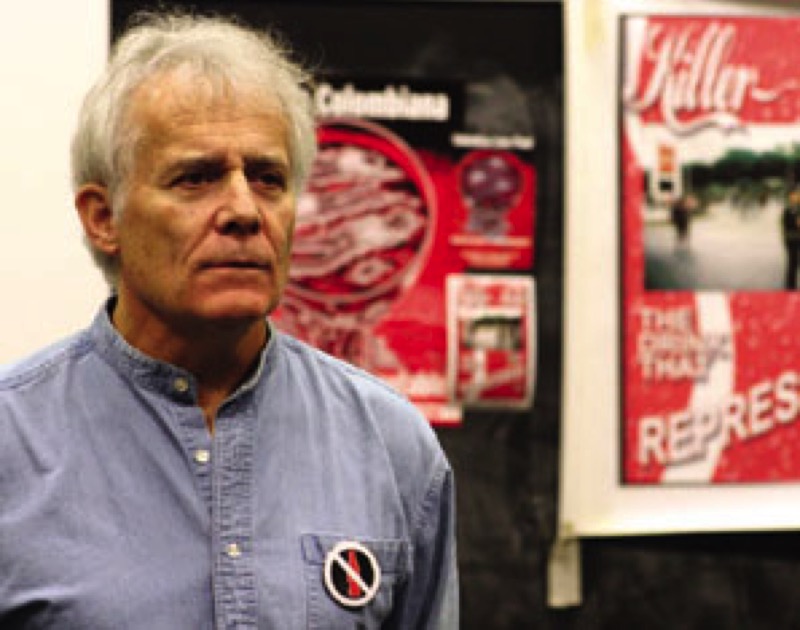
Photo by Hope Moore, The Lantern
The Lantern, "Coke offers more than empty calories," By Harry Lindner, January 16, 2008
Read Opinion Piece
"I was at first skeptical of the accusations he [OSU Student Eddie Klatka] made against Coca-Cola. He said the corporation 'has a laundry list of human rights and worker's rights violations extending around the world,' that, in India, Coke is 'continually polluting villages, where their bottling plants are located, with toxic waste' and that, in Columbia, union leaders have been killed or threatened with murder. This all sounded very serious and far-fetched, so I did some independent research..."
The Lantern, "OSU should can Coke deal," By Eddie Klatka, November 21, 2007
Read Opinion Piece
" 'As a 21st century land-grant university, The Ohio State University will set the standard for the creation and dissemination of knowledge in service to its communities, state, nation and the world. Our faculty, students and staff will be among the best in the nation. [OSU's Mission Statement]' How then are we, OSU students, faculty and staff, able to allow a contract with corporations, such as Coca-Cola, whose business practices are unethical and immoral? The Coca-Cola Corporation has a laundry list of human rights and worker's rights violations extending around the world. The countries of India and Columbia are most affected by Coca-Cola's actions. This article is to inform the OSU community about the dangers of re-signing the contract between the university and the Coca-Cola Corporation."
Nov. 8 Day of Action
Pitzer College, California, Kicks Off Its Campaign
Today at Pitzer we began our petition drive to stop Pitzer from renewing their contract with Coke. On our first day of tabling outside the cafeteria we gave out samples of a local soda and collected over 100 signitures for our petition (Pitzer has 960 students.)
We also Chalked dead body outlines on sidewalks all over our campus and left facts about Coke near them. This created a lot of positive discussion amoung the student body.
j. Simon's Rock College, Massachusetts
The Llama Ledger (Simon's Rock), "Bookstore to discontinue purchase of vitaminwater," By Shanna Gregory, November 14, 2007
Read Article
"The Coca-Cola Company announced its intended purchase of vitaminwater's parent company, Glaceau, this summer, only months after Simon's Rock decided to stop selling the company's products.
"While students like Isser want vitaminwater out of the store and off campus immediately, bookstore manager Sara Monsonis explained why the bookstore maintains buying the remaining stock of Vitamin Water will not directly support Coca Cola.
"Monsonis said that as of Nov. 1, the small distributor that provides for the Simon's Rock store, G. Housen, stopped purchasing vitaminwater. From the time when Coke purchased vitaminwater in May, until Nov. 1 the distribution of the drinks had remained in the hands of the small distributors, such as G. Housen.
"The vitaminwater that is in the bookstore currently is pre-Coke takeover of vitaminwater's previous owner, Glaceau.
"Monsonis said the bookstore refuses to restock on vitaminwater, as it would necessitate going through Coca-Cola and that is something Simon's Rock students have elected to be off campus."
The Llama Ledger, "New drinks replace Coke in bookstore, vending machines: Activist Collective not happy," By Timothy Cama, August 29, 2007
Read Article
"Students and employees returning to Simon's Rock this fall noticed a whole new line of drinks both at the bookstore and in on-campus vending machines, thanks to a successful campaign to remove Coca-Cola products from campus. While the Simon's Rock Bookstore now carries beverages from Polar Beverages, Inc., in Worcester, the eight new drink vending machines on-campus carry mainly Pepsi Co. products, a fact that doesn't please students who spent a good part of last year campaigning for the change..."
"[Katharina] Kempf, along with sophomore Elizabeth "Bizzy" Davis, had hoped that a smaller, more local company than Pepsi would supply drinks for the campus's vending machines.'Pepsi is not a great alternative,' said Davis, adding that the company is 'not a small, sustainable business.' "
Read point 1a in our May 14th newsletter
Read May 7th article from The Llama Ledger
k. Stony Brook University, SUNY, New York
The Statesman (Stony Brook University), "Coca Cola, Pepsi, or Cadbury-Schweppes: New Contract Bid to Run Through June 2008," By Adam Peck, December 13, 2007
Read Article
The Statesman (Stony Brook University), "A New Contract With an Old Problem," By The Statesman Editorial Board, December 13, 2007
Read Editorial
The Stony Brook Statesman , "Coca Cola Defends Allegations: The Coca Cola Conundrum, November 15, 2007
Read Coke's arguments
The Stony Brook Statesman, "Students Speak Out Against Coca Cola's Human Rights Violations: The Coca Cola Conundrum," November 15, 2007
Read Stony Brook students response
Correction: In the Students' response is an error which is in the process of being corrected by the Statesman. It reads: "Students from at least 45 colleges and universities, including Rutgers and New York University, have spearheaded movements against Coke and over 30 have kicked Coke off their campuses." It should state: "Students from some 200 colleges and universities, including Rutgers and New York University, have spearheaded movements against Coke and over 45 have kicked Coke off their campuses."
Coke: "In a country in which violence against union members has deterred all but 4 percent of workers from unionizing, 31 percent of Coca-Cola bottler employees belong to unions."
Students: "Coke lies about the percentage of Coke workers in unions; they falsely claim 31 percent. However, Coca-Cola considers that the vast majority of Coke workers in Colombia are not employees, but rather "flexible," subcontracted workers who have no chance of union representation, receive low pay and meager benefits (if any), have no job security and often are living under poverty. Due to Coke's campaign of terror directed at union leaders, only about 4% of Coke's workers in Colombia belong to unions. Recently, two groups of subcontracted workers attempted to join SINALTRAINAL, the major union representing Coke employees, but were fired."
l. University of Albany, SUNY, New York
On December 10, Campaign to Stop Killer Coke Director Ray Rogers was invited to address the University Auxiliary Services which reviews bids for campus beverage contracts. (Read Ray's statement.) The Auxiliary Services is composed of administrators, student leaders, faculty and staff. Following Ray's comments, Professor James Collins, chair of the Anthropology Department and a member of the United University Professions (UUP) executive committee, the faculty union at SUNY Albany, raised issues as to why Coca-Cola's exclusive contract should not be renewed.
We held our Battle Over Beverages forum Thursday, November 15 and as you can see from the pics below, we had a great turnout — over 50 students attended! Below is a short description of the event.

Jackie Hayes addressing the forum
UAlbany held the forum to discuss the social, environmental and health implications of our beverage contracts on campus. Over 50 students attended and we discussed the negative health effects of high fructose corn syrup and aspartame found in soda, the waste generated by our over 200 vending machines on campus, as well as Coca-Cola's abuses in Colombia, India and El Salvador. After the presentation we opened the floor and students discussed alternatives to our exclusive Coke contract including contracting with local vendors. At the end of the meeting students sent emails to our Administrators urging them to sever the Coke contract.
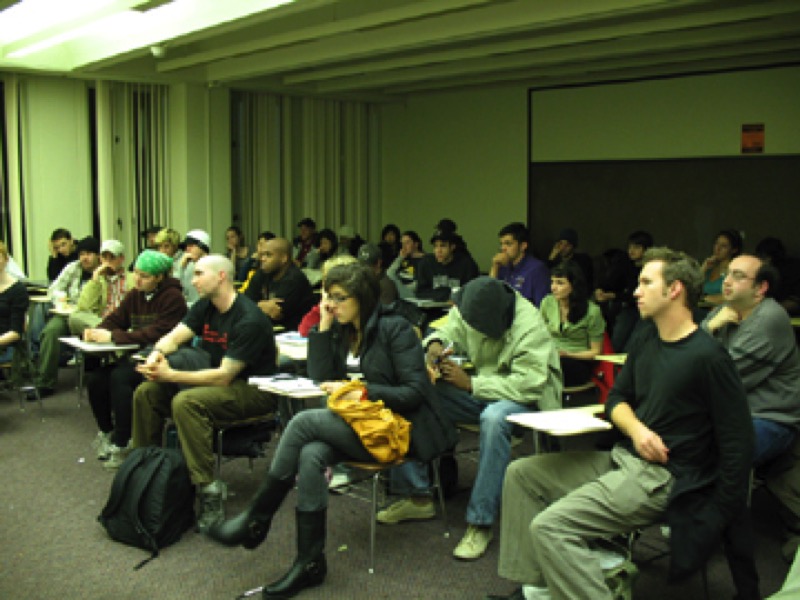
Red and Black (University of Georgia), "Students lead protest of Coca-Cola," By Kristen Coulter, November 28, 2007
Read Article
"A group of University students are protesting Coca-Cola this week. Members of the Rhetoric of Social Movement class are protesting against Coke because of allegations about the company's business practices...The group planned one protest activity for each day. On Monday and Tuesday, they put up fliers and posters. Today, they plan to unplug or put out of order signs on campus vending machines. On Thursday, they will host an information session and debate in the SLC."
In this article, Kirsten Witt, spokesperson for Coca-Cola, stated: "Killer Coke is a Web site managed by a group of professional activists and is full of myths and rumors that have been proven false." Ms. Witt continues to lie for The Coca-Cola Co. as part of her job. Contrary to her statement, all of the information on our site is well-researched and well-documented. As anybody who studies The Coca-Cola Co. recognizes, what the company does well is to lie and mislead. (For responses to her false and misleading statements, go to our Critical Talking Points.)
We at the Campaign to Stop Killer Coke are committed to continue working with students, faculty and others in the University of Michigan community to get all Coke products removed from the campus and to hold those adminstrators who have served as Coke cheerleaders accountable. When will UM adminstrators end their charade with Coke pretending that a legitimate investigation of past and present labor practices and policies in Colombia is being pursued by the International Labor Organization? Be sure to read the first part of this newsletter regarding the TERI report on Coke in India.
Michigan Daily, "Viewpoint: Same 'U' on Coke and commencement," By Lindsey Rogers, January 17, 2008
Read Article
"I was filled with a sense of sadness because the rest of the student body was painfully learning what I had learned over the last four years: The University administration shows a callous disregard for student voices.
"I remember when I first realized the University disregarded students. It was the day I first received a phone call from the Daily, less than four months after the University had suspended its contract with Coke in late 2005. Our campaign had been meeting with the administration regularly, trying to find third-party auditors to assess Coke's environmental impacts in India and its labor practices in Colombia. University administrators assured us that it would take no action before consulting us as well as the communities in India and Colombia we strove to represent. On the day I received the call from the Daily, though, I was informed that the University had gone back on its word and resumed purchasing from Coke behind our backs.
"On Monday I got another call from the Daily. The University had responded to a 16-month investigation by The Energy and Resources Institute and decided to continue doing business with Coke. I was shocked. The TERI report was scheduled to become public that day. I wondered how University officials could have read a report that was more than 500 pages and responded in a single day. But as I learned at yesterday's meeting with administrators, both Coke and the University had access to the TERI report in December. Our organization was never involved. Rather, Coke was given the opportunity to read and respond to the report before we even heard about it. The University made a decision completely without student input.
"There is an important lesson to be learned here: As students, we cannot assume that the University is acting in our best interests or the best interests of the community - local, national or international. Rather, we must be prepared to be the conscience of this university. We must insist that the University upholds its own standards and values. We must demand to have a voice in the process - not just on where we have our graduation, but on diversity, fair trade, human rights and monitoring Coca-Cola's compliance with the Vendor Code of Conduct as well."
Michigan Daily, "Some skeptical as 'U' keeps Coke contract: Following report, 'U' to continue contracts worth about $1.2M," By Charles Gregg-Geist, January 17, 2008
Read Article
When one reads this article, you would have to question the ethics of University of Michigan's Peggy Norgren,, the University's associate vice president of finance, and Andy Hoffman, a professor in the Ross School of Business, who along with Chief Financial Officer Tim Slottow, have become nothing more than Coke's cheerleaders. They set a very poor example for students at the university.
The Michigan Daily, "Activism and survival in our times," By Neil Sardana, November 8, 2007
Read Article
"Our University has been directly involved in this issue by ordering the investigation of Coca-Cola's operations in Colombia and India. However, in several steps along the process, the University administration has looked the other way on Coke's violations and has helped the company hide its crimes by creating an 'investigation process' that has not even started yet. It is important for the University community to stand up to these injustices and to speak out against the University's involvement in them. The University of Michigan Stop Killer Coke Coalition formed to challenge the administration on this issue and is working to unite the campus to finally put an end to this stain on our University's image. This is, in the end, about challenging the power of Coca-Cola and making the company recognize that it cannot continue to operate in such a disgraceful manner without consequences."
On Dec. 16, Matt Beard, student filmmaker at University of Montana, who produced the excellent 20-minute documentary, "The Cost of a Coke," sent the following message. The film is certainly having an impact on all who see it.
"I'd like to thank everyone at the campaign in New York for helping to make "The Cost of a Coke" such an internet success so far! Since it's release, over 2,000 people have watched including youtube and myspace.tv, and I've given DVDs to people locally and to a free speech TV station in Denver so far. Next semester will be exciting to see how many college campuses we can get to suspend their contracts or discontinue their renewals next year!"
"The Cost of a Coke," Part 1
Watch Part 1 of "The Cost of a Coke"
"The Cost of a Coke," Part 2
>Watch Part 2 of "The Cost of a Coke"
"The Cost of a Coke," Part 3
Watch Part 3 of "The Cost of a Coke"
The Norman Transcript (University of Oklahoma), "Former economic hit man challenges students to make a difference," November 14, 2007
Read Article
" 'Even on the OU campus, there is enormous potential for change,' he [author of bestseller "Confessions of an Economic Hit Man" John Perkins] said. 'The university contracts with Coca-Cola and Nike, both of which need to improve their social and environmental policies.'"
q. University of San Francisco, California
Here's an update regarding the current Coca-Cola petitioncirculating at University of San Francisco. I am currently leading a movement at USF to kick Coke off campus. I have a few hundred signatures on the petition, and have presented it to our Student Senate. Senate passed a resolutionsupporting the ban of all Coca-Cola products on campus, and urging our campus to be human rights friendly. I had a meeting with our financial services office and found out, to my discouragement, that we have an exclusive contract with Coca-Cola that does not expire until 2010. Furthermore, the contract is blind, meaning that no one outside of the office of business can view the contract or reveal the terms. The only two ways out of this contract are if A.) Coca Cola breaks it's terms, or B.) No one on campus buys any Coca-Cola products at any time. We are still working on ways to get around that.
r. University of Saskatchewan & University of Regina, Canada
Students on the campuses of University of Saskatchewan & University of Regina met this month over a weekend to coordinate campaigns to kick Coke off their campuses. They are planning some big events to draw attention to Coke's many human rights abuses and other injustices. Involved in their meeting were also students from the University of Alberta, University of Calgary and University of Winnipeg.
University of Saskatchewan Students:
To contact the university's campaign against Killer Coke, email popthemonopoly@gmail.com
s. University of Vermont
"Here's a quick update from the university of vermont on recent happenings. We've just gotten approved by the budget and finance committee to review the university's investment with Coca-Cola. This will be reviewed and recommended by a work group made up of members from the board of trustees and representatives from all parts of the university, including faculty, students and administration. We will present our material to the group who will then decide to continue their investment with Coke or not. This is a great step in helping address the issue to the administration. We will surely use the media and other events to help motivate their decision to cut Coke here at Vermont."
Nov. 8 Day of Action
University of Vermont gives out apple cider and gets signatures
"We here at the University of Vermont promoted a day of boycotting Coca-Cola this past Thursday by giving out free hot apple cider for students ang getting signatures for our petition. A good number of people stopped by our table and signed up to join our list serve and group here. Many of the students and faculty who stopped by supported our campaign and others seemed to change their views on coke."
(Nov. 8 Day of Action)
Vassar Students, Faculty and Staff Hold Rally Against Coca-Cola
At Vassar we held a 30-40 person rally to Kick Coke today. Present were students from the Vassar Greens, Student Activist Union, Amnesty International, Vassar Green Party, MEChA, and Class Issues Alliance, as well as members of SEIU and CWA, and faculty members. We got some local media coverage as well, print, TV and radio. Should be a good rallying point for us, we are now going to kick up the pressure on our administration and begin working on taste tests for local sodas and juices to hopefully replace Coke.
Mid-Hudson News Network, "Vassar College students urge administration to remove Coke from campus," November 9, 2007
Read Article
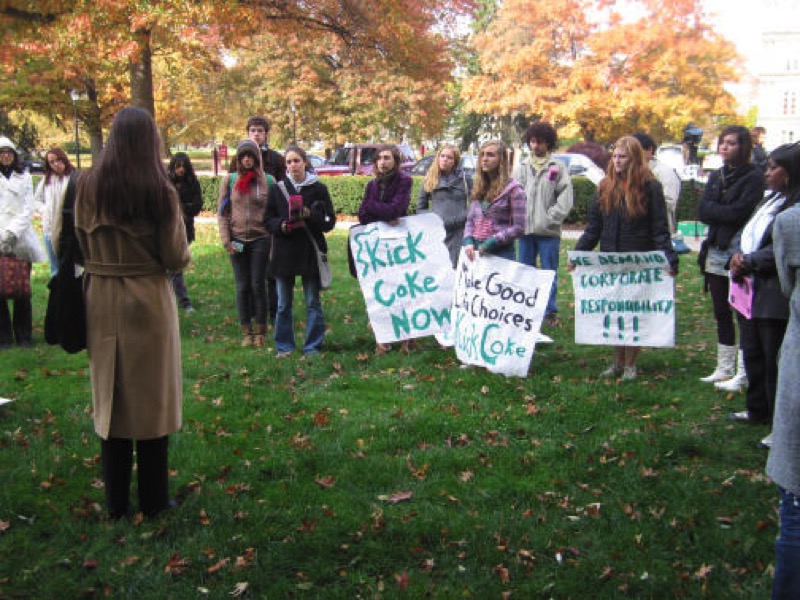
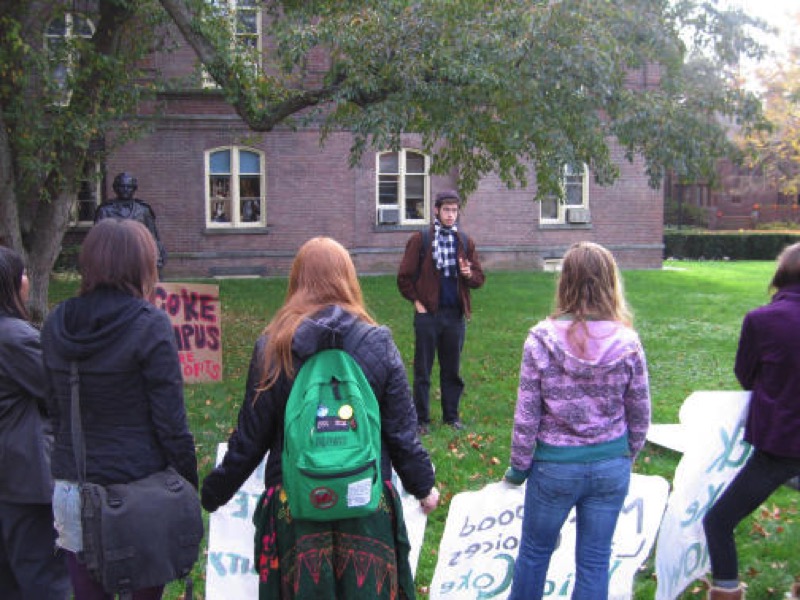
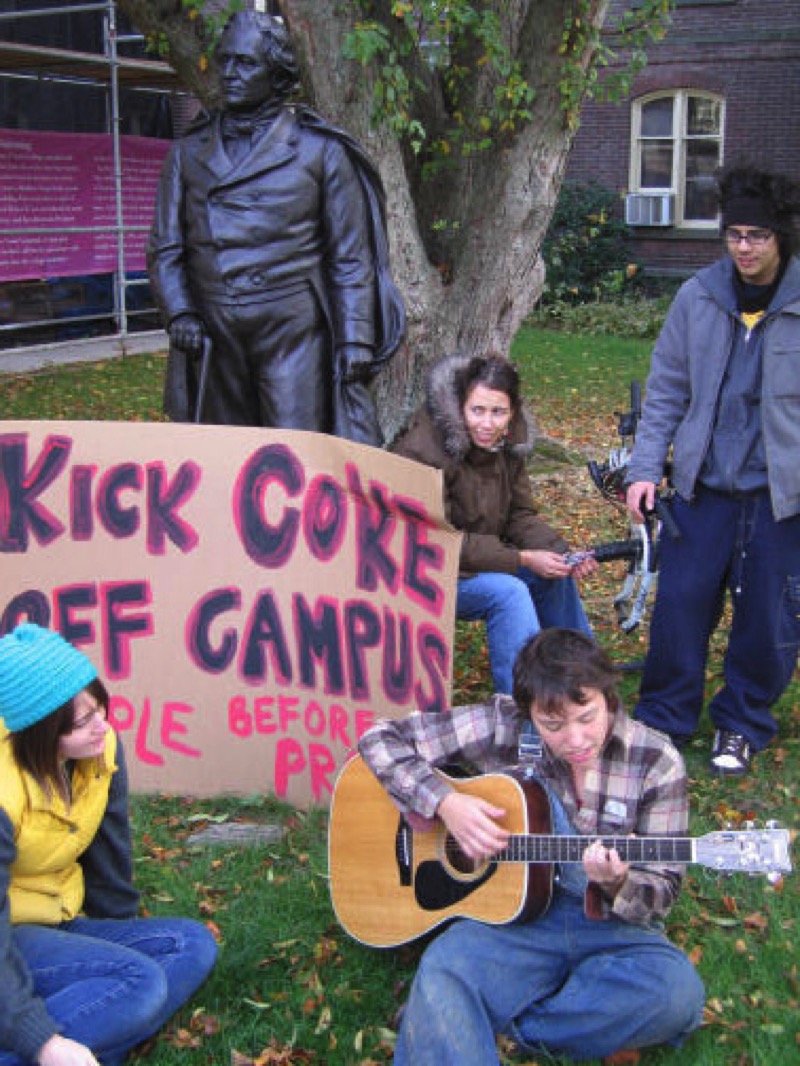
Kick Coke Campaign, Vassar College, October 2007
Read Newsletter
THE MISCELLANY NEWS, "Campus groups broaden consumer choices," By Acacia O'Connor, November 8, 2007
Read Article
"Concern for the individuals involved in production is also at the heart of the Vassar branch of the Kick Coke campaign. The student-led movement is pushing to remove Coca-Cola from Vassar's campus. The campaign hopes to instead replace Coke with more socially conscionable local juices and sodas."
Check out the United Students Against Sweatshops Winter Conference in Miami!
For three days, from February 8-10, students from throughout the US and Canada will be gathering in Miami to:
Learn more about how to support workers both on their campuses and abroad
Participate in a protest at the Burger King Headquarters
Share ideas and experiences with other student activists
Attend workshops focused on running stronger campaigns and challenges systems of oppression
Hear directly from some of the workers who produce for our schools
This is a great opportunity to get energized and excited about worker solidarity, and we want as many people as possible to be able to attend.
So, if you or anyone else you know is interested in attending then please register today at www.studentsagainstsweatshops.org
Also, please spread the word to others in your group or your community.
See you in Miami!
The USAS Winter Conference will be February 8-10 in sunny Miami, FL. Register today at www.studentsagainstsweatshops.org
Zack Knorr
United Students Against Sweatshops
International Campaigns Coordinator
Cell: 951-368-8004
Office: 202-NOSWEAT
Email: zack@usasnet.org
a. Ontario Public Service Employees Union (OPSEU) Local 499, Canada Spearheads Movement to Dump Coke
One of the most important developments worldwide on the labor front is the momentum building to win the support of Canada's largest provincial union, the 120,000-member Ontario Public Service Employees Union, as reported by Nelson Ross Laguna, president of OPSEU Local 499, the biggest local for the Liquor Board Employees Division of OPSEU.
"Hey Folks:
"First off, I just wanted to mention that the latest International Workers of the World's (IWW) British magazine, Bread and Roses has an article about Killer Coke. Also, the Edmonton branch of the IWW here in Canada has an article on Killer Coke in their latest newsletter.
"Below is a link to Local 499's resolution, which passed unanimously resolving "that OPSEU Local 499 bans all Coke products from all OPSEU Local 499 offices and functions and calls upon other local unions, to do the same." Another resolution will be brought forward at this year's OPSEU convention with the support of other locals, as well as all of the equity committees which includes the provincial young workers committee, provincial human rights committee and the provincial women's committee.
"We are confirming that Ray Rogers will be a featured speaker to make a presentation at this year's annual convention in April, which will include over 1,500 members.
"I will be putting together a booth about Killer Coke and will hand out Killer Coke materials to 1500 people or more. The provincial young workers committee sent a donation to the Campaign for the leaflets, stickers, posters and DVDs.
"In November, we held seven regional meetings across the province. At all of our Fall educationals, Campaign to Stop Killer Coke literature was handed out and all of the equity committees made presentations against Killer Coke to over 1,000 members. In Ottawa, my presentation was well received and many members have taken up the cause.
"Thanks for all the graphics you sent us to help us create t-shirts.
"What more can I do?
"In solidarity,
Nelson Ross Laguna
President, OPSEU, Local 499
Ottawa, Ontario
b. USW, AFL-CIO President Leo Gerard's Letter Appeal Violence Against SINALTRAINAL Leaders
Read Letter
"I am writing to express my grave concern for the lives and well-being of the members of the SINALTRAINAL union, and, most specifically, of union leaders Javier Correa, Luis Eduardo Garcia and Jose Domingo Florez & union leaders from the town of Bucaramanga — in the wake of recent threats against them."
c. Phillipines Labor Coalition Boycotts Coke
Visayan Daily Star, " We'll boycott Coke products — labor coalition, The Organization of Free Workers-Against Labor Oppression, December 27, 2007
Read Article
"The Organization of Free Workers-Against Labor Oppression will declare their boycott of all products of Coca-Cola Bottlers Phils. Inc. during a "Workers' Forum" on Dec. 28, from 9:30 to 10:30 a.m., at the Workers' Livelihood Center in Bacolod City, Phillippines, a press release from the group said."
d. Coke in Russia Fires Union Leader
The Moscow Times, "A New Era for Labor Unions," By Boris Kagarlitsky, December 6, 2007
Read Article
"...when punitive measures were brought against workers demanding their rights. Valery Sokolov, leader of the labor union at Heineken's brewery in St. Petersburg, was dismissed following a work slowdown staged there in April. Before that, Sergei Dolgy, chairman of the first Coca-Cola employees' union, was fired in similar fashion."
e. Coke in Ireland Shuts Down Union Plant & Opens a Non-Union Plant
Political Affairs, "Ireland: American Transnationals Continue to Undermine Trade Union Growth," By Socialist Voice, November 26, 2007
Read Article
"Coca-Cola Ireland informed employees at the Drogheda plant in September of its decision to close in September 2008. Union representatives have inferred that the decision has been largely influenced by the fact that the Ballina plant is non-union, and that the pay and conditions of workers there are 'far inferior' to those at the unionized Drogheda plant. One TEEU [Technical, Engineering & Electrical Union] official, Arthur Hall, commented: 'This is corporate greed at its worst. This is a highly profitable operation, and it has not lost a day of production in disputes for well over a decade. The only reason why it is moving its main production to Ballina that I can see is that it has a non-unionized work force there and can ensure that less of its profits stay in the local economy.' "
4. Poland's Growing Stop Killer Coke Campaign Worries Coke
Warsaw, Poland, Killer Coke's Santa Claus reveals he is a 'closet right-wing paramilitary' — "Ho, ho, ho - have some bloody Coke", December 16, 2007
Read about the Polish action
"The half-paramilitary/half-Santa Claus actor loaded his weapons when he saw Coca-Cola's trade unionists giving out information about Coke's crimes. One by one he assassinated the workers, with impunity. three activists staged a die-in while playing the roles of the slain Coca-Cola employees and former SINALTRAINAL trade union leaders"
"An interesting part of the action was the fact that the PR chief of Coca-Cola Poland arrived right on time for the beginning and stayed for the whole event. She was unbelievably ignorant of Coke's dark history so I enjoyed playing the role of teacher for her."
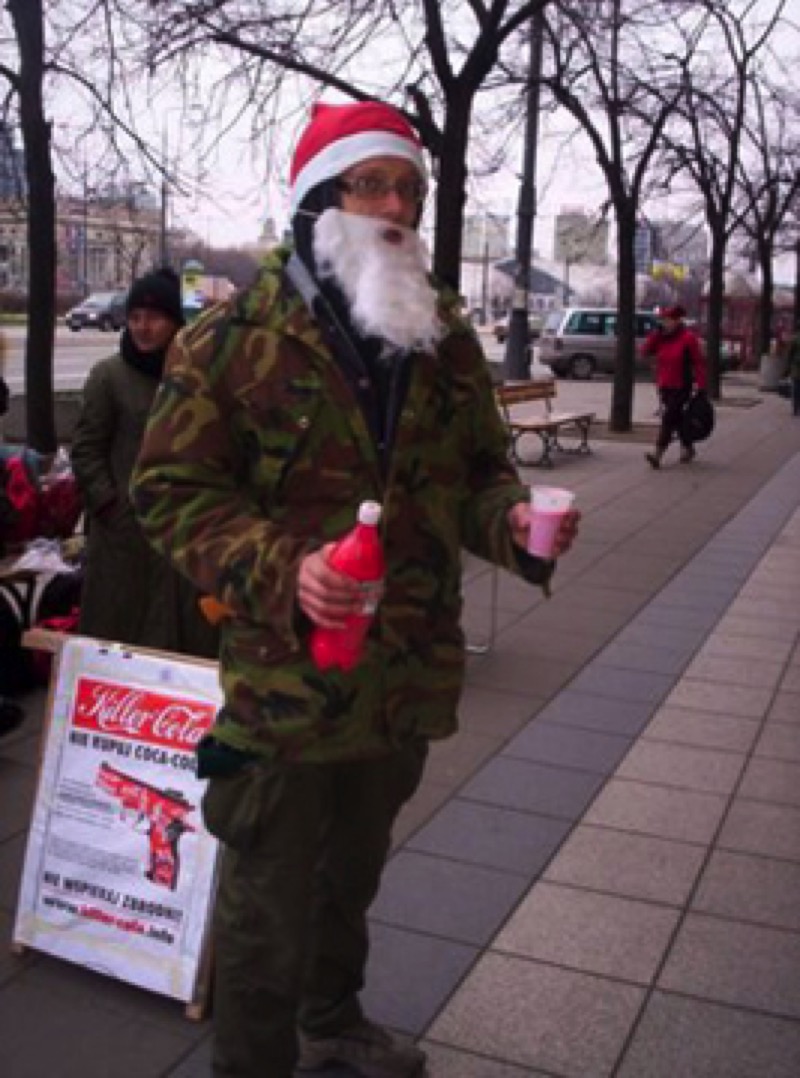
Come on, one drop of Killer Coke won't kill ya!!!
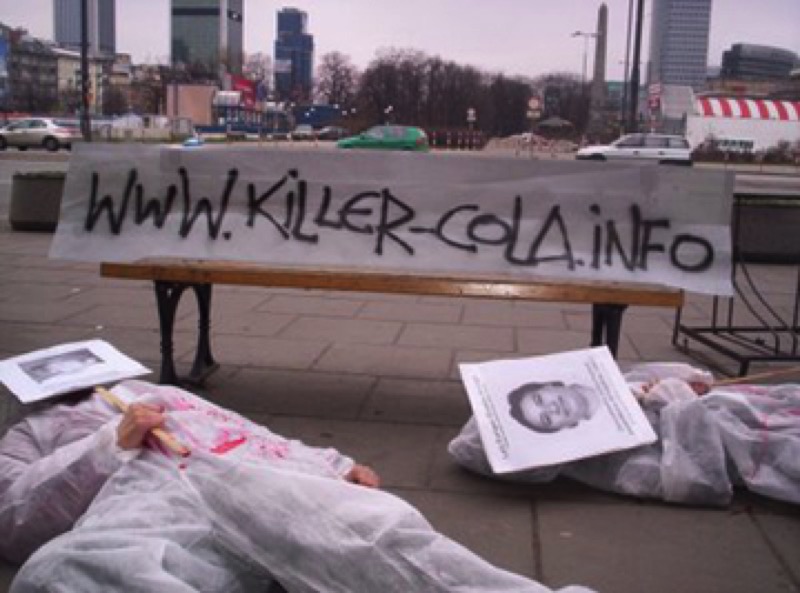
www.killer-cola.info
Watch a Video of the Polish Action
Killer Cola - Poznaj krwawy smak zbrodni
Click here to see another video from the Polish campaign
5. Videos Exposing Coke's Lies & Worldwide Abuses
a. Matt Beard, A Justice Film, "The Cost of a Coke," University of Montana
Matt Beard, a student at the University of Montana, created a wonderful 20-minute film entitled, "The Cost of a Coke." We, at the Campaign, were delighted with many segments of the film, especially Matt's use of graphics and video to highlight Coke's abuses, how Judge Joe Martinez was shown to be in conflicts of interest as he deals with the Coca-Cola Alien Tort Claims lawsuits in Miami and how the ILO (International Labor Organization) "investigation" turned out to be a scam.
"The Cost of a Coke," Part 1
Watch Part 1 of "The Cost of a Coke"
"The Cost of a Coke," Part 2
Watch Part 2 of "The Cost of a Coke"
"The Cost of a Coke," Part 3
Watch Part 3 of "The Cost of a Coke"
b. Dispatches: Mark Thomas on Coca-Cola
"Dispatches: Mark Thomas on Coca-Cola," a 46-minute film, was produced in England by Mark Thomas, a well-known social critic and investigative journalist (Mr. Thomas is the narrator and appears throughout the film), and film producer-director Sarah MacDonald. Ms. MacDonald is the recipient of British Academy of Film & Television Awards (BAFTA). Her investigative documentaries include "Burma's Secret War," "Torture: The Dirty Business" and "Undercover in the Secret State."
The film was broadcast nationally on Channel 4 in England on November 19, 2007 from 8 to 9 pm. The viewing audience was about 1.6 million. The film highlights Coke's human rights and environmental abuses in Colombia and India, as well as Coke's ugly history of racial discrimination and collaboration with the Nazis during World War II. The footage taken in El Salvador shows child laborers cutting sugar cane in the fields and shows trucks taking the cane from the fields to Coke's sugar supplier. There are interviews with Salvadoran political leaders very critical of Coke regarding child labor and environmental abuses. And there's more...
- Mark Thomas on Coca-Cola Part 1
- Mark Thomas on Coca-Cola Part 2
- Mark Thomas on Coca-Cola Part 3
- Mark Thomas on Coca-Cola Part 4
- Mark Thomas on Coca-Cola Part 5
c. Killer Coke to AFI's "Prelude 12/21"
Created by a student for a homework assignment
Click here to watch this video
d. My Killer Coke Campaign Video
Created by a student, Alex Ford, for a homework assignment
Click here to watch this video
6. Coke Director Cathleen Black Event
On Nov. 26, Coke Director and President of Hearst Magazines Cathleen Black spoke at the 92nd Street Y, NYC. Campaign to Stop Killer Coke supporters were there to educate those attending the event.
The flyer that was distributed:
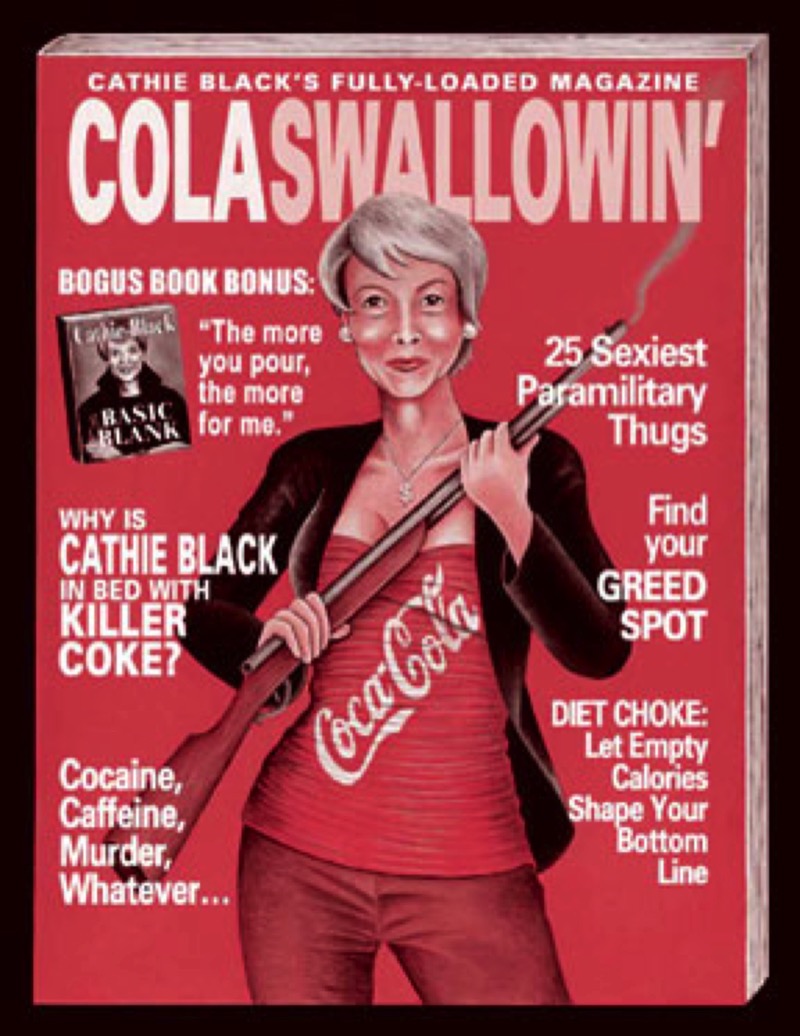
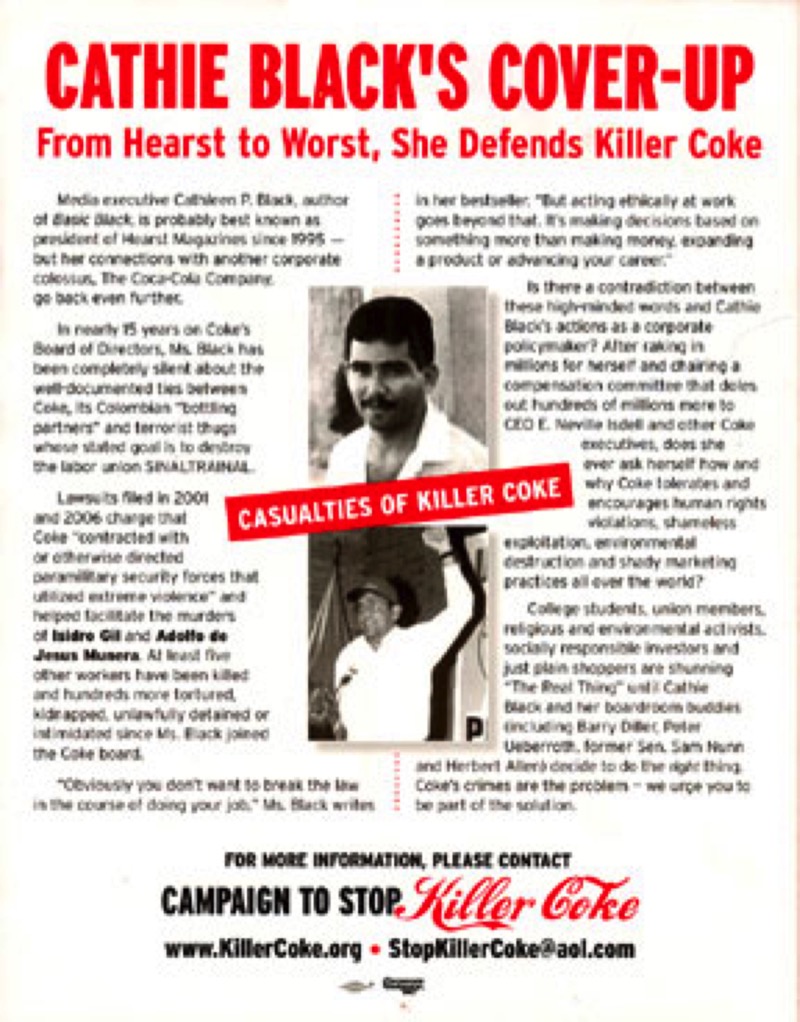
See side one of our flyer in pdf format
See side two of our flyer in pdf format
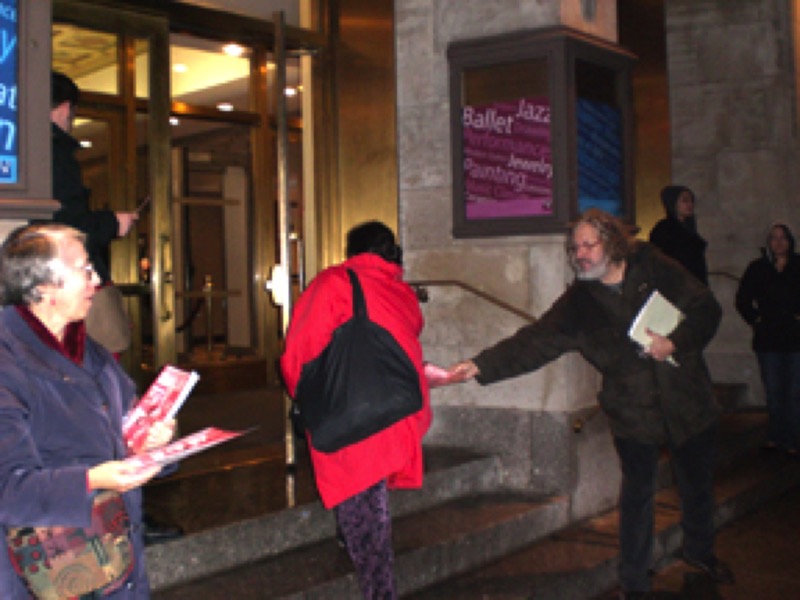
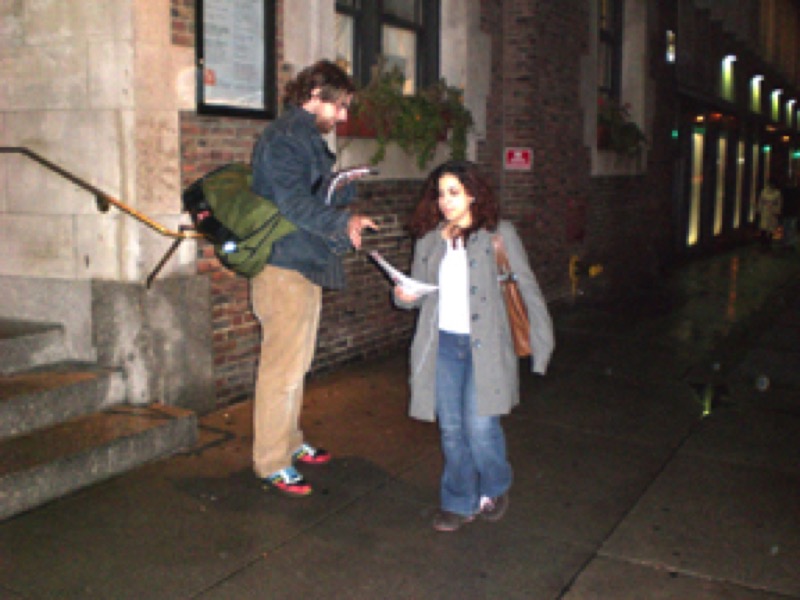
7. Doonesbury, Dasani Remains DaPhony and other Water Issues
'Doonesbury' Disses Dasani!
Coke and Pepsi bottle municipal tap water as 'Dasani' and 'Aquafina' and sell it to us at twice the cost of gasoline," observes the fictional entrepreneur Chad Severnson in cartoonist Garry Trudeau's Sunday, Dec. 2nd 'Doonesbury' strip.
Chad's next comment to radio talk-show host Mark Slackmeyer, a mainstay of Trudeau's long-running feature, makes a point that the Campaign to Stop Killer Coke has always stressed: "Bottled water is a triumph of perceived need over reason & the greatest marketing coup in history."
Since 'Doonesbury' is one of the most widely syndicated comic strips in the English-speaking world, it's safe to assume that the millions who saw the Dec. 2nd episode made up the largest audience ever exposed to such a righteous, anti-coke and anti-Dasani message. In case you missed it, have a look at it below.
The Campaign salutes Garry Trudeau and Universal Press Syndicate for this well-timed and perfectly-aimed arrow through the heart of a colossal fraud and key Coca-Cola profit center. We also recommend our own "Dasani is DaPhony" mini-poster as rendered by another fine cartoonist, Jay Lynch, and writer-editor Joe Pilati, who have collaborated on several leaflets and posters for the Campaign. The mini-poster can be seen below.
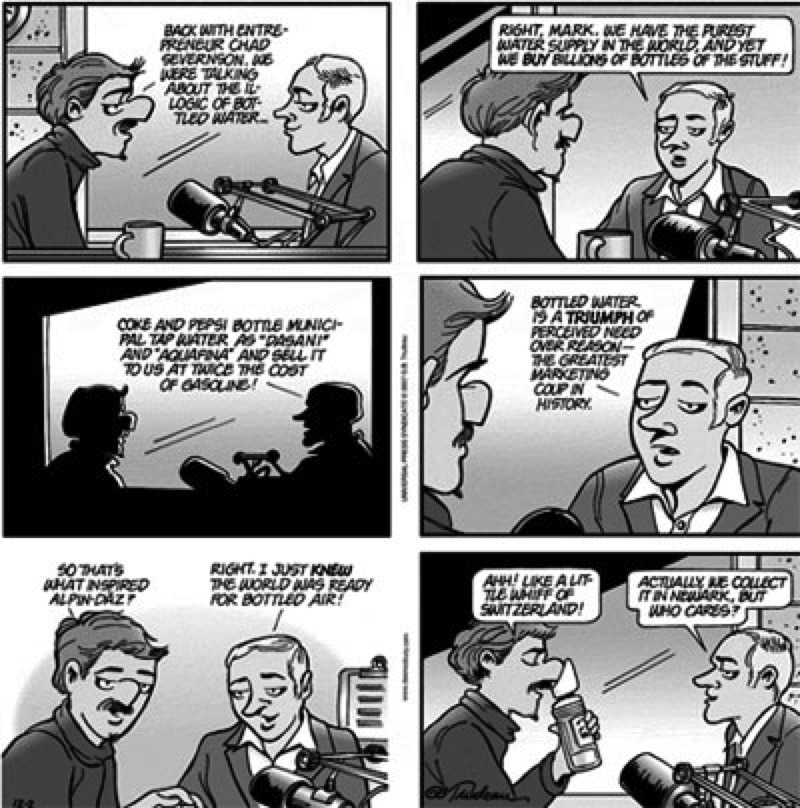
Doonesbury by Garry Trudeau
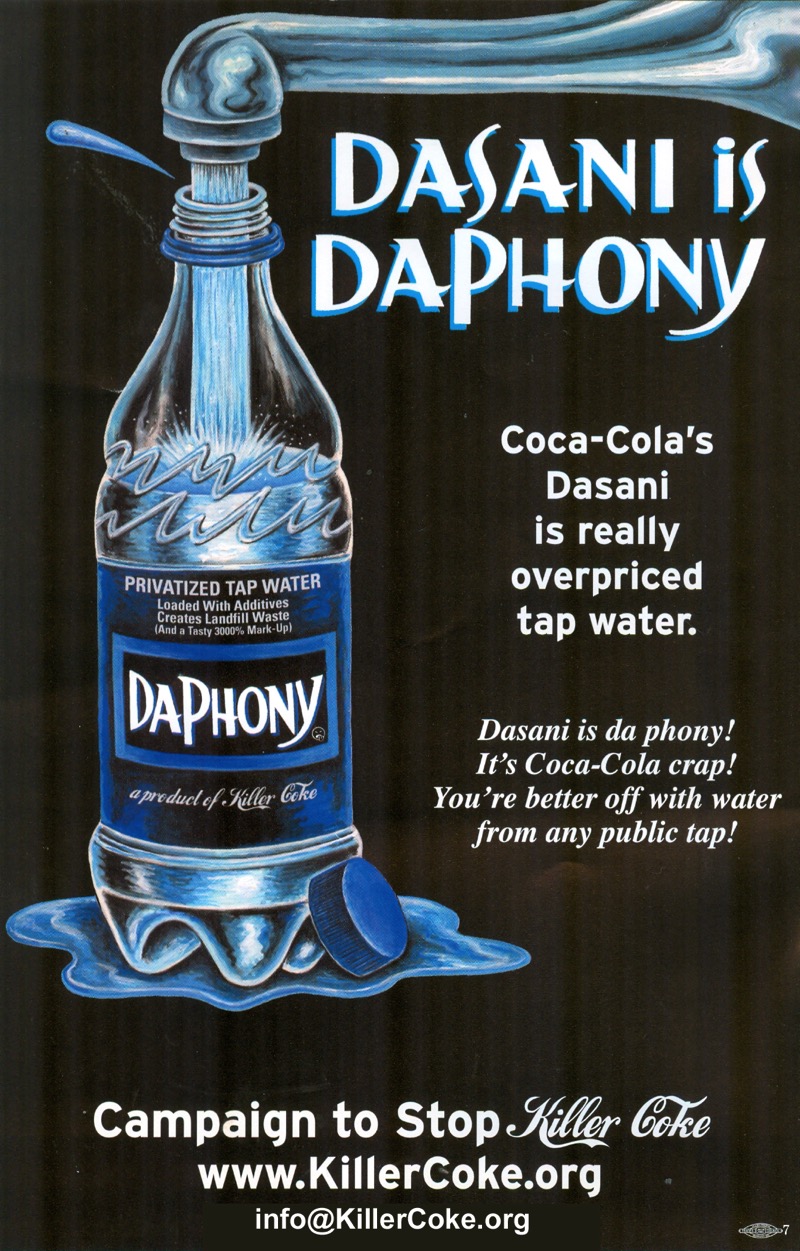
Earth Policy Insitute, "BOTTLED WATER BOYCOTTS: Back-to-the-Tap Movement Gains Momentum," December 2007
Read Data
Read about back-to-the-tap initiatives in the following cities: Davis, CA; Emeryville, CA; Los Angeles, CA; San Francisco, CA; San Jose, CA: Santa Barbara, CA; Chicago, IL; Urbana, IL; Louisville, KY; Boston, MA; Ann Arbor, MI; St. Louis, MO; New York, NY: Salt Lake City, UT; Charlottesville, VA; Vancouver, WA; Wauwatosa, WI; Manyly, NSW; Burnaby, BC; Vancouver, BC; Charlotteown, PEI; Town of the Blue Mountains, ON; Ottawa, ON; Toronto, ON; Paris, France; Florence, Italy; Rome, Italy, and Liverpool, UK. States and Counties: California, U.S.; Santa Clara County, CA, U.S.; Cook County, IL, U.S.; Illinois, U.S.; Massachusetts, U.S.; Frederick County, MD, U.S.; Maine, U.S.; Michigan, U.S.; Jackson County, MO, U.S.; New York State, U.S.; Oregon, U.S.; New South Wales, Australia; Cornwall County, UK; Stroud District, Gloucestershire County, U.K. National Governments: Denmark; U.K. Government Agencies; Green Party, U.K. and more.
peopleandplanet.net, "Bottled water backlash is growing," By Janet Larsen, December 7, 2007
Read Article
"From San Francisco to New York to London, Rome and Paris, city governments, high-class restaurants, schools, and religious groups are ditching bottled water in favour of what comes out of the tap. With people no longer content to pay 1,000 times as much for bottled water, a product no better than tap water, a backlash against bottled water is growing."
Scienceline, "Is vitaminwater good for you?" By Christopher Intagliata, December 3, 2007
Read Article
"...vitaminwater's parent company, Glaceau (owned by Coca-Cola), markets the drink by emphasizing its nutritional value. Is there any science behind the marketing though?
"...'The way that vitaminwater is marketed and positioned it's made to look more healthful than other sugary beverages, but it's not — it's still just a soft drink,' said Margo G. Wootan, Director of Nutrition Policy at the Center for Science in the Public Interest. 'It has this aura of healthfulness that is not deserved. Adding vitamins and minerals to junk food doesn't make it healthy.' "
Stuff.co.nz (New Zealand), "Another first for Charlie's," By Jenny Ruth, December 2, 2007
Read Article
"...vitaminwater's parent company, Glaceau (owned by Coca-Cola), markets the drink by emphasizing its nutritional value. Is there any science behind the marketing though?
" 'The way that vitaminwater is marketed and positioned it's made to look more healthful than other sugary beverages, but it's not — it's still just a soft drink,' said Margo G. Wootan, Director of Nutrition Policy at the Center for Science in the Public Interest. 'It has this aura of healthfulness that is not deserved. Adding vitamins and minerals to junk food doesn't make it healthy.' "
Plenty Magazine, "Drinking Problem: Across the country, folks are working to wean Americans off bottled water," By Dianna Dilworth, November 19, 2007
Read Article
" 'Our fundamental concern is that bottled water companies are changing the way that we think about our water and setting out to turn our water into a high priced luxury and not a fundamental human right,' says Deborah Lapidus, the group's national organizer."
The Seattle Times, "The newest public enemy: bottled water," By Sandy Bauers, November 12, 2007
Read Article
"Bottled water, once an icon of a healthy lifestyle, has become a pariah, the environmentally incorrect Humvee of beverages. In recent months, dissent over the once innocuous bottle of Aquafina or Dasani has grown from a trickle to a tsunami. Not just among enviros who decry the
1.5 million barrels of oil used to make a year's worth of bottles. (Plus more to transport it from, in the case of Tasmanian Rain, the end of the earth.)..."
The Daily Free Press [Boston University], "Students push for clearer labels on bottled water," By Evelyn Ratigan, November 11, 2007
Read Article
"Students across the country yesterday [Nov. 7] held demonstrations to pressure the Coca-Cola Company to be more transparent about the origin of the water it uses in its bottled water product, Dasani. Demanding that the company be more clear that Dasani water comes from the same source as tap water, Corporate Accountability International - the group that organized the nationwide rallies - sponsored the Day of Action at Boston College, Tufts University and Boston University, where CAI company representatives met with environmental groups."
The New York Times, "The Claim: Too Much Cola Can Cause Kidney Problems," By Anahad O'Connor, January 22, 2008
THE FACTS
It is well known that too much soda can increase the risk of diabetes and obesity. But when it comes to kidney problems, is there a difference between colas and other kinds of soda?
Colas contain high levels of phosphoric acid, which has been linked to kidney stones and other renal problems.
Much of this conclusion stems from anecdotal and circumstantial evidence. So last year, a team of scientists at the National Institutes of Health took a closer look.
In a study published in the journal Epidemiology, the team compared the dietary habits of 465 people with chronic kidney disease and 467 healthy people. After controlling for various factors, the team found that drinking two or more colas a day - whether artificially sweetened or regular - was linked to a twofold risk of chronic kidney disease.
But drinking two or more noncola carbonated drinks a day, they found, did not increase the risk.
The authors of the study say more research is needed, but their findings support the long-held notion that something about cola - the phosphoric acid, for example, or the ability of cola to pull calcium from bones - seems to increase the risk of kidney stones, renal failure and other conditions affecting the kidneys.
THE BOTTOM LINE
There is good evidence that cola beverages can increase the risk of kidney problems, more so than noncola sodas.
CSPI Newsroom, "Consumer Groups in 20 Countries Urge Coke, Pepsi to Limit Soft Drink Marketing to Children: Cola Promotion in Elementary School Physical Activity Program Cited"
Read Article
"The group, at a press conference in Mexico City on December 10, exposed an elementary school nutrition campaign sponsored by Coke that portrays Coca-Cola as one of several beverages that can be used for hydration after physical activity. The campaign's organizers are urging consumers around the world to alert them to similarly misleading marketing efforts by Coca-Cola or PepsiCo in other countries."
The Global Dump Soft Drinks Campaign
Read How Coca-Cola Secretly Advertises to Kids
Food Week Online, " 'Jury' raps Coca-cola over ad campaign," December 10, 2007
Rea Article
"A 'trial by jury' panel set up by The Parents Jury has returned a guilty verdict against Coca-Cola's marketing campaign that promotes Coca-Cola as a suitable accompaniment to the family dinner."
Scoop Independent News-Health (New Zealand), "Aspartame Research Needed, Not Coca-Cola Soft Sell," November 26, 2007, Press Release: Soil and Health Association
Read Article
" 'Aspartame consumption has been linked to many health symptoms, including those expressed as ADHD, anxiety, depression, irritability, confusion, memory loss, insomnia, dizziness, migraines, cramps, abdominal pain, numbness or tingling of extremities, rashes, chronic fatigue, and personality changes. These same symptoms are increasingly expressed among our young people, and removal of aspartame may assist with a marked improvement in quality of life for some, their families and teachers.' "
9. Major reports from the campaign that are useful in organizing
Critical Talking Points from the Campaign to Stop Killer Coke
Read the Critical Talking Points on Killer Coke
LABOR AND HUMAN RIGHTS: 'The Real Thing' in Colombia, By Lesley Gill
Read Report
Colombia Solidarity Campaign, "The Anti-Coke Manifesto," By Andy Higginbottom, Secretary, Colombia Solidarity Campaign
Read Manifesto
Read Manifesto in Italian
"Inside the Real Thing: Corporate profile on Coca-Cola Corporation," Report by the Polaris Institute (Canada)
Read the report in pdf format
NYC fact-finding delegation's report on human rights violations by Coke - Final Report, NYC Council Member Hiram Monserrate, April 2004
View Full Report in pdf - html
View Appendices
War on Want, Press Release and Report, "Coca-Cola under fire as World Cup comes to London, Released March 20, 2006
Read Release
Read Report, "Coca-Cola: The Alternative Report"
En Español
Seven Points to Settlement
Read the Seven Points.
"ILRF Director Terry Collingsworth Response to Coke's Denials," July 8, 2004
Read Response
"University of Michigan Falls Prey to Another Coca-Cola PR Scam," Campaign to Stop Killer Coke
April 17, 2006 Press Release/Report
WB11, New York Feature on the Campaign to Stop Killer Coke
On July 11, 2005, WB11, one of New York City area's major television stations aired a special "Fact Finders Report" on the Campaign to Stop Killer Coke called "Coca-Cola Faces Human Rights Violations." Interviewed are Campaign Director Ray Rogers, Hofstra University Campaign Activist Vanessa Cudabac, New York City Council Member Hiram Monserrate, New York City Comptroller William Thompson and American Postal Workers Union (APWU) Secretary-Treasurer Terry Stapleton. This excellent feature was watched by millions on WB11 and, as we found out from supporters, watched by others around the world on satellite television.
Play Tape of Show
The Campaign's Response to Coke's Statements on the WB11 Feature
Read Response
Video, "State of the Union," produced by Insight News for Channel 4 of Great Britain.
Watch State of the Union
10. Do you need a customized Campaign leaflet?
When we invited supporters to contact us to "customize a leaflet for your campus, union or group," the response was terrific! We immediately began getting emails asking us to produce customized leaflets for numerous colleges, universities, high schools and middle schools. We put them up as soon as we could. We have leaflets for Australia, Canada, Colombia (in Spanish), India, Ireland, Japan, the UK and the US.
Because the demand for flyers was so strong, it took up too much server space. We decided to leave the list online with the schools listed for which we have customized flyers. If you need a copy of your flyer, please contact us and we'll email it to you as soon as possible.
Look to see if your customized flyer is listed.
If your school, union or group is not listed and you would like a customized leaflet, please contact us at info@KillerCoke.org. Please state the name of your school and the name of the sponsoring group, if any, and a local email address, if you want us to put them into the flyer. If you want the flyer for a group, please state the name of the group and an email address. Also, whenever you email the Campaign to Stop Killer Coke, please include a phone number, if possible, in case we have a need to talk with you.
11. Campaign's 'Campus Activism' Section
Many students interested in launching a Campaign to Stop Killer Coke at their schools and colleges have been contacting us. We recommend that students begin by checking out the two organizing packets in our "Campus Activism" section:
- "Unthinkable! Undrinkable! A Campus Campaign Overview," a USAS Campus Guide
- Campus Activism Packet — Campaign for a Coca-Cola Free Campus
- Schools Active in the Campaign to Stop Killer Coke
In addition, there are numerous reports, resolutions and articles in the "Campus Activism" section that can be useful.
12. Take Actions Against Coke!
- Send an e-mail to Coke to protest their abuses in Colombia
- Call Coca-Cola and tell them to stop their worldwide abuses at 1-800-GET-COKE.
- Sign a Petition protesting Coke's abuses
- Join the Boycott at Karmabanque's web site at: www.karmabanque.com
- Send an E-Card to Coca-Cola
13. Please send photos, reports of events, etc. for the Campaign website
Please send photos, reports of events, and if you are in a school, union or organization that has banned Coke products, please send us the resolution or a description of how the decision was made. We would like the Campaign website to be up-to-date and to share the information via our newsletter. (Whenever you email us, please include your phone number and the best times to contact you, including weekends.)











